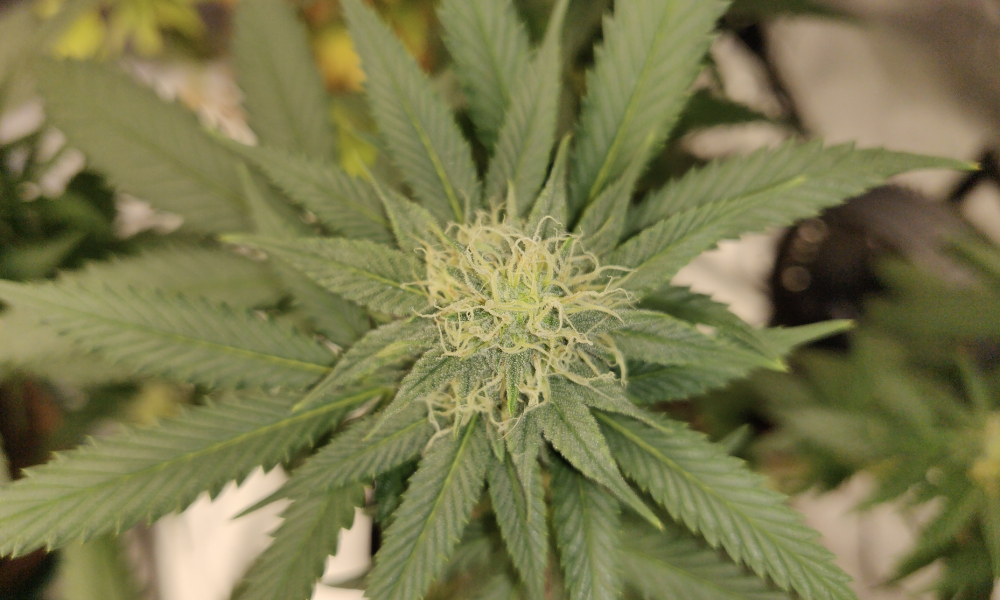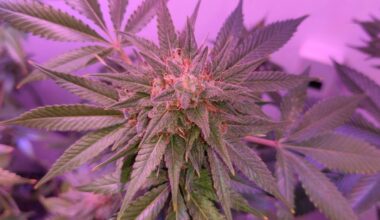Senators have filed another pair of marijuana amendments to a large-scale defense bill. The new proposals, if enacted, would legalize medical cannabis for military veterans and press the Department of Veterans Affairs (VA) to ensure that people who served in uniform don’t miss out on federal home loan benefits just because they work in the marijuana industry.
These are the latest cannabis-related amendments that have been proposed for the Senate version of the National Defense Authorization Act (NDAA). Last week, Sen. Ron Wyden (D-OR) filed measures to make it so marijuana use alone couldn’t be grounds to deny federal security clearances.
Now Sen. Brian Schatz (D-HI) has introduced an amendment that mirrors the language of a standalone bill, the Veterans Medical Marijuana Safe Harbor Act, that he’s sponsoring.
The measure would allow veterans to legally possess and use cannabis under federal law, as recommended by doctors in accordance with state law. Physicians with VA would also be allowed for the first time to issue such recommendations. Further, it would require VA to study the therapeutic potential of marijuana for pain and reducing opioid misuse.
The text is the same as the standalone legislation, except that it doesn’t contain a findings section and doesn’t call for a specific amount of funding to be appropriated for the study components. Instead, it says that Congress should provide as much funding as “necessary to carry out” the research.
Separately, Sens. Jacky Rosen (D-NV) and Cynthia Lummis (R-WY) filed an amendment to NDAA that simply expresses “the sense of Congress” that veterans “should not be denied access to Department of Veterans Affairs home loans on the basis of income derived from State-legalized cannabis activities.”
While VA has clarified that there’s nothing in statute precluding veterans from receiving home loan benefits if they work at a state-legal marijuana business, “many veterans continue to be denied access to home loans on the basis of income derived from State-legalized cannabis activities,” the amendment says.
The senators said VA “should improve communication with eligible lending institutions to reduce confusion among lenders and borrowers on this matter.”
On the House side, the chamber approved an identical amendment as part of the NDAA this summer. As originally introduced by Rep. Katherine Clark (D-MA), the measure would have outright prohibited the home loan denials, but it was changed to non-binding form before passing.
The House also adopted a proposal from Reps. Earl Blumenauer (D-OR) and Brian Mast (R-FL) to the defense bill that would codify that VA doctors can discuss and issue recommendations for medical cannabis to veterans. It stopped short of explicitly legalizing medical marijuana possession for veterans, however.
The Senate is using the House bill as the vehicle for the NDAA, but the chamber is expected to vote on an amendment to replace the language with its own text, and so these new amendments would revise that version.
It remains to be seen whether the Senate will go along with the House on other drug policy reform measures that cleared the chamber in July. That includes provisions on marijuana banking, psychedelics research and more.
Meanwhile, Senate leaders are also seeking to attach separate broader intelligence legislation to NDAA that had included a provision preventing the denial of security clearances over cannabis when it was approved by a Senate committee earlier this year.
But last week, two GOP senators protested the inclusion of the marijuana language and it was dropped from the measure, prompting the sponsor to separately file broader amendments on the issue.
One of the latest proposals from Sen. Ron Wyden (D-OR) would prevent the denial of federal security clearances for people over cannabis use at any time, while the other would limit the protection only to people who admit to past use prior to entering national security vetting.
Sens. Chuck Grassley (R-IA) and John Cornyn (R-TX) had raised an objection to attaching the standalone Intelligence Authorization Act to NDAA if it included his previous marijuana security clearance provision that was approved by the Intelligence Committee over the summer.
(Cornyn separately blocked a House-passed bipartisan cannabis research bill from an expedited Senate floor vote last week by raising an objection to its consideration under unanimous consent.)
Wyden’s earlier amendment to the standalone had already been watered down in committee prior to being adopted.
As introduced, the senator’s measure would have “prohibited any Federal agency from denying or revoking an individual’s eligibility for access to classified information solely because of past or present use of cannabis.”
It was changed to make it so only past cannabis use would be covered, and that the protection would only apply to people who work for intelligence agencies, rather than any federal agency.
Sens. Alex Padilla (D-CA) and Dianne Feinstein (D-CA) separately proposed a separate NDAA amendment last week that calls for federal, state, tribal and local collaboration to address remediation of lands damaged by illicit cannabis cultivation.
—
Marijuana Moment is tracking more than 1,500 cannabis, psychedelics and drug policy bills in state legislatures and Congress this year. Patreon supporters pledging at least $25/month get access to our interactive maps, charts and hearing calendar so they don’t miss any developments.![]()
Learn more about our marijuana bill tracker and become a supporter on Patreon to get access.
—
Advocates welcome these efforts to use NDAA as a vehicle to enact these changes, but there are significantly more drug policy reform components in the House-passed version that advocates would also like to see included in the final NDAA following bicameral negotiations.
For example, the House version currently includes proposals to protect banks that work with state-legal cannabis businesses. The chamber adopted the banking amendment as part of last year’s NDAA as well, but the Senate didn’t go along so it was not included in the final bill.
Rep. Ed Perlmutter, sponsor of the Secure and Fair Enforcement (SAFE) Banking Act, said earlier this month that if the Senate doesn’t advance cannabis banking reform in some way, he’s prepared to “go to the nuclear option” in the House Rules Committee and hold up separate legislation like NDAA.
With respect to VA medical cannabis recommendations, Rep. Nancy Mace (R-SC) had an amendment adopted that similarly provides VA doctors with issuing authority, but it goes further by prohibiting federal employers from discriminating against veterans who use, or have used, marijuana.
Rep. Alexandria Ocasio-Cortez (D-NY) secured two drug policy amendments to the NDAA. One that passed the House builds on a measure from Rep. Seth Moulton (D-MA), requiring the Department of Defense (DOD) to study marijuana as an opioid alternative in the treatment of service members with post-traumatic stress disorder (PTSD), traumatic brain injuries and severe pain. Ocasio-Cortez’s proposal widens the scope of that research to include psilocybin and MDMA.
Ocasio-Cortez’s amendment to prevent the use of funds for aerial fumigation on drug crops in Colombia was also adopted. The practice has been widely criticized by reform and human rights advocates.
Another psychedelics amendment that cleared the chamber this summer was sponsored by Rep. Dan Crenshaw (R-TX). It would allow the secretary of defense to approve grants for research into the therapeutic potential of certain psychedelics such as MDMA, psilocybin, ibogaine and 5–MeO–DMT for active duty military members with PTSD.
The House also passed a measure from Rep. Rashida Tlaib (D-MI) that would require DOD to study the “historically discriminatory manner in which laws related to marijuana offenses have been enforced, the potential for the continued discriminatory application of the law (whether intentional or unintentional), and recommendations for actions that can be taken to minimize the risk of such discrimination.”
Rep. Anthony Brown (D-MD) added an NDAA provision in committee to address cannabis sentencing standards under military code, mandating that the Military Justice Review Panel “develop recommendations specifying appropriate sentencing ranges for offenses involving the use and possession of marijuana.”
Another drug policy amendment attached to the House bill by Rep. Mikie Sherrill (D-NJ) seeks to eliminate the federal sentencing disparity between crack and powder cocaine.
Whether senators will go along with enacting any of these reforms in the final bill remains to be seen, but they would not be included under Senate leaders’ proposed amendment to entirely substitute the language of the House bill with the chamber’s own approach that will be considered when lawmakers return to Capitol Hill after the midterm elections.
Most Americans Don’t Think Marijuana Is Dangerous Despite Prohibitionist Arguments, Poll Finds
Photo courtesy of Mike Latimer.
Medical Disclaimer:
The information provided in these blog posts is intended for general informational and educational purposes only. It is not a substitute for professional medical advice, diagnosis, or treatment. Always seek the advice of your physician or other qualified healthcare provider with any questions you may have regarding a medical condition. The use of any information provided in these blog posts is solely at your own risk. The authors and the website do not recommend or endorse any specific products, treatments, or procedures mentioned. Reliance on any information in these blog posts is solely at your own discretion.







